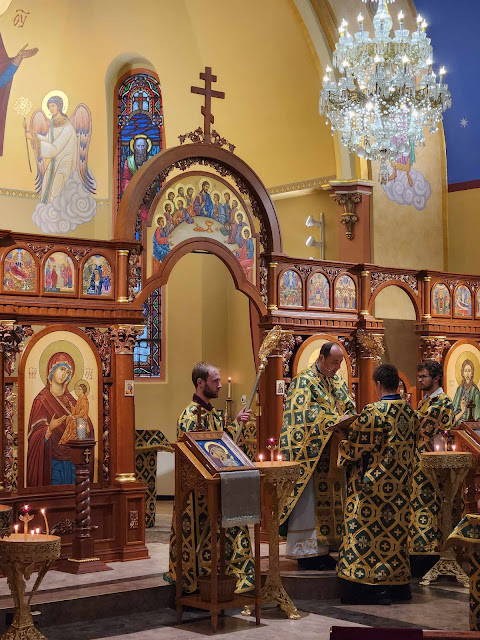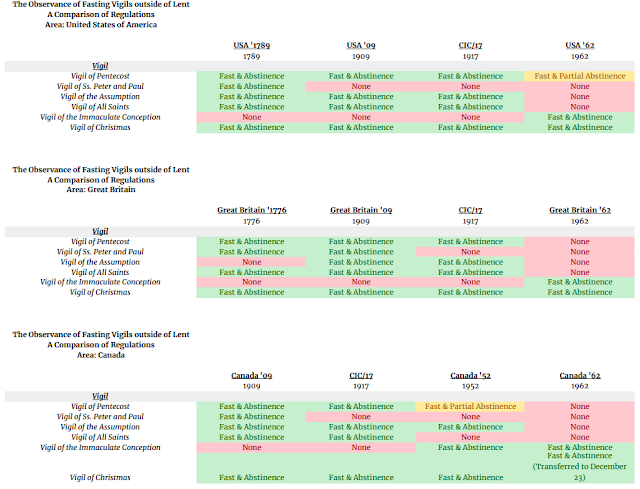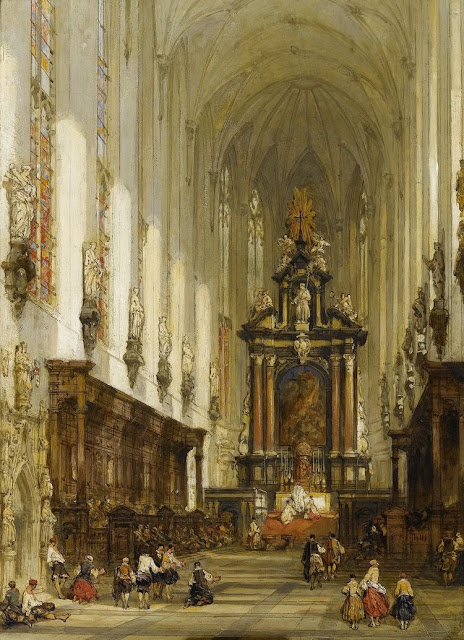The Divine Liturgy celebrated at St. Mary’s Byzantine Catholic Church in Whitting, IN
Is Orthodoxy the True Faith?
It is evident with the crisis in the Catholic Church concerning not only the sexual abuse crisis but the crisis in the Liturgy after Vatican II that some Catholics have become disillusioned with the current Catholic hierarchy. From an outside perspective, some might ask why they should remain Catholic and not convert to Eastern Orthodoxy, which is known for reverent, ancient liturgies under the name of the Divine Liturgy of St. John Chrysostom (or St. Basil the Great at some times).
But on a more deep analysis, there is no refuge in Orthodoxy. While we often think of the Orthodox as schismatics and not as heretics, the doctrinal crisis has also affected them. Some definitions to start from the Catholic Modern Dictionary of Father John Hardon:
Heresy: In the Roman Catholic Church, heresy has a very specific meaning. Anyone who, after receiving baptism, while remaining nominally a Christian, pertinaciously denies or doubts any of the truths that must be believed with divine and Catholic faith is considered a heretic. Accordingly four elements must be verified to constitute formal heresy; previous valid baptism, which need not have been in the Catholic Church; external profession of still being a Christian, otherwise a person becomes an apostate; outright denial or positive doubt regarding a truth that the Catholic Church has actually proposed as revealed by God; and the disbelief must be morally culpable, where a nominal Christian refuses to accept what he knows is a doctrinal imperative.
Schismatic: In the Roman Catholic Church, heresy has a very specific meaning. Anyone who, after receiving baptism, while remaining nominally a Christian, pertinaciously denies or doubts any of the truths that must be believed with divine and Catholic faith is considered a heretic. Accordingly four elements must be verified to constitute formal heresy; previous valid baptism, which need not have been in the Catholic Church; external profession of still being a Christian, otherwise a person becomes an apostate; outright denial or positive doubt regarding a truth that the Catholic Church has actually proposed as revealed by God; and the disbelief must be morally culpable, where a nominal Christian refuses to accept what he knows is a doctrinal imperative.
How is the Orthodox Church Falling Into Heresy?
The Orthodox generally reject the following dogmatically defined truths which a Christian must accept:
- The Holy Ghost proceeds from both the Father and the Son.
- The Immaculate Conception of the Blessed Virgin Mary (i.e., that She was conceived without the stain of original sin) despite significant proof from the Early Church Fathers. It is well known that a number of Orthodox prelates believed this.
- The Primacy of Peter and the Bishop of Rome. This existed even in the first century.
- The indissolubility of Marriage since the Orthodox allow a second and even a third marriage for divorced persons. On the contrary, the Magisterium has always maintained the prohibition of divorce and remarriage, even for Eastern Rite Catholics (Council of Lyon II [1274], Benedict XIV [1743] due to our Lord’s own words (Matthew 19:6).
- The state of the soul needed to approach the Blessed Sacrament.
- The use of artificial contraception being opposed to the will of God.
- The fact that Baptism may validly be received only once.
There is No Unified Body of Doctrine in the Orthodox Church
The Orthodox Church is actually not a unified Church but a collection of different groups with different beliefs, which attacks two fundamental marks of the Church. The four marks of the Church can only be present in the Church founded by our Lord Jesus Christ. And Orthodoxy attacks two of them significantly:
Oneness: St. Paul in his Epistle to the Ephesians asserted that there is “one Lord, one faith, one baptism” (Eph. 4:5). The Church is one because she was founded by Jesus, the one and only Son of God, Who taught one unified body of doctrine. Granted, there is great diversity in the Church regarding cultures, gifts, ways of life, and offices, yet there is unity in government (under the visible head, the Pope), faith, and sacraments. The Roman Catechism explains, “The first mark of the true Church is described in the Nicene Creed, and consists in unity….” Likewise, the Baltimore Catechism teaches, “The Church is one because all its members agree in one faith, are all in one communion, and are all under one Head.”
Catholicity (i.e., Universality): The word « Catholic » literally means “universal.” The Church is the universal body of believers established by Christ and meant for all people of all corners of the world for all times (cf. Matt. 28:18-20; Apoc. 5:9-10). The etymology of the word “catholic” is the Greek adjective katholikos, which is related to the adverb katholou, meaning “in general” or “according to the whole.” This definition helps communicate the fact that the Catholic Faith is for people of every place, culture, and class. There is no one who is not called to a member of the true Faith. As St. John relates in the Book of the Apocalypse: “Thou art worthy, O Lord, to take the book, and to open the seals thereof; because Thou wast slain, and hast redeemed us to God, in Thy blood, out of every tribe, and tongue, and people, and nation” (Apoc. 5:9).
In hindsight, I came to realise that what Greek Orthodoxy lacked was the universality of the Creed; “I believe in ONE, holy, CATHOLIC and Apostolic Church…”. I experienced holiness and Apostolic succession, but didn’t feel the oneness in the increasingly splintering Orthodox churches nor any sense of universality. I felt cut off from my family and peers, because the Greeks showed no interest in my desire to evangelize the Australian people. I was told sternly, “That’s not our way, not our spirit. No one will listen to you because you are not Greek. Besides, you joined a Greek church, why do you want to change us? We are Greek, that’s who we are.” I couldn’t reconcile this attitude with Christ’s solemn command to baptise the nations, nor the actions of the Apostles in the Book of Acts.
As long as the Orthodox attack fundamental dogmas of the Christian Religion, they can never be an option. On the contrary, the Catholic Church comprises many Eastern Rite Catholics who left Orthodoxy to be reunited with Rome and the oneness of doctrine but retain their beautiful and reverent liturgies.
In fact, some groups like the Society of St. Josaphat are aligned with the SSPX in the fight for Tradition and for the preservation of the Eastern Rites.
Resources for Anyone Tempted to Leave Traditional Catholicism for Orthodoxy
Books:
Articles:
Videos:




